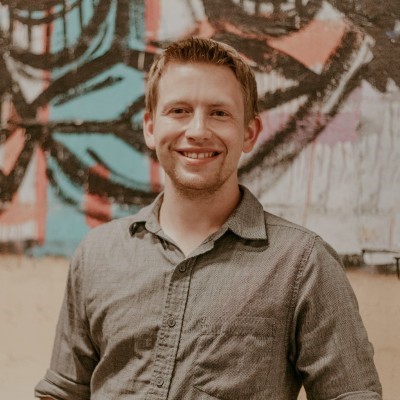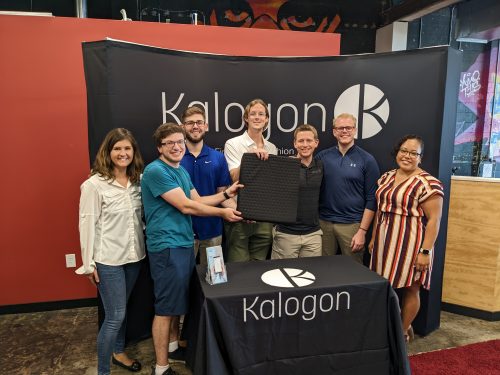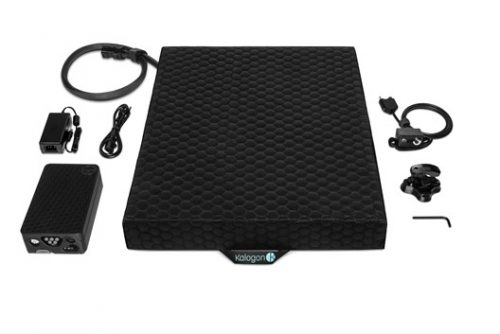In conversation with Praxis SCI Incubate cohort member, Kalogon

Tim Balz, CEO & Founder of Kalogon talks to us about their Smart Cushion which helps accelerate the healing process of pressure injuries and also prevent new injuries from forming.
Kalogon is a company based out of Brevard County, Florida on a mission to alleviate pressure injuries and chronic pain in people who have a spinal cord injury (SCI). Led by CEO and Founder Tim Balz, Kalogon is a diverse team of award-winning engineers and advocates for the wheelchair community. Between them, they’ve developed the Kalogon Smart Cushion, a technology that allows wheelchair users to dynamically control the contours and firmness of particular areas of their seat cushion.
The Kalogon Smart cushion is intended to be a market disruptor. It is designed to not only accelerate the healing process of pressure injuries, but also prevent new injuries from forming. The dynamic, customizable and self-tailored product is designed to meet every individual’s needs.
What led you to a career focused on medical technology for people living with SCI?
I first discovered my love for wheelchair design while in high school. A manual wheelchair user and fellow student in the recycling program would get slowed down when collecting heavy bins. I sold parts from my moped on Craigslist to raise money so I could upgrade their wheelchair. I added a sound system and a hitch to pull the recycling bins, made it left handed and added a leg rest. It got some attention when it was featured on the news; after that I just started rebuilding wheelchairs and giving them to people who needed them.
After graduating with a Mechanical Engineering degree, I was invited by Intel to join an intern project based on my proposal for the world’s first smart wheelchair. That project helped me develop my passion to work in the spinal cord injury space, especially because one of my close design partners on the project has a spinal cord injury and also worked directly with Stephen Hawking.

Photo: Team Kalogon with their Smart Cushion
Through conversations at Praxis we learned that if you have limited hand function, it actually isn’t as accessible. We used SCI consumer input to better design a more accessible UX.
What was your biggest takeaway from the Praxis SCI Incubate Program?
Enhancing our Beta testing protocols. Before the program, the Kalogon team would talk to our consumers for one-off check-ins and quality assurance tests. The program highlighted the importance of receiving systematized and ongoing feedback as well as valuing input from user experience. Now we have built out a group of consumers who have the product, with whom we regularly connect to pick their brains on how to improve the product and our processes. This is definitely something we’ll keep investing in going forward.
“The entire program is extremely well-rounded; it was very surprising to me how diverse the issues were on which we were able to assist.” Tim Balz, CEO & Founder
What were the biggest changes to your company’s structure or business strategy arising out of the program?
There were two major changes. Firstly, Kalogon completely restructured a co-founder’s position to ensure as much engagement with our customers as possible. Now they are responsible for the beta testing program, figuring out how to organize data and to fairly compensate people with an SCI who help to develop the Kalogon cushion.
Secondly, we changed our sales focus. Before the program, our focus was on complex rehab and nursing homes. Since participating in the program, we shifted our focus on complex rehab for initial markets only. We refocused on selling to SCI consumers at the Department of Veterans Affairs and to those requiring complex rehabilitation technology. We came to that conclusion much faster thanks to the program.
How did the program change how you viewed challenges faced by your customers?
Customer-centered design was something we were already doing. However, learning about user challenges in the program helped with developing our design and gave us a greater sense of empathy. We are now better placed to put ourselves in the customer’s shoes. Before, we thought our product was accessible enough to use, but through conversations at Praxis, we learned that if you have limited hand function, it actually isn’t as accessible. We used SCI consumer input to better design a more accessible UX.
Kalogon has also developed a strong culture of people-first language. Through the Praxis program, we witnessed how language use impacts each department’s work. Using person-first language changes our team’s perspective on the impact and process of our work, focusing on empowering our consumers.
Did your perspective change on how your customers would use your product?
Our team learned a lot about the user experience and the importance of skin integrity; how often a user transfers, and how important it is to have a light-weight seat had a huge impact on our design. For example, we learned that some users lift their chairs over their heads, which can cause shoulder issues. We modified the cushion to make it easier to take the cushion off the chair while keeping the weight down for those that leave the cushion on.
Company Successes Due to the SCI Incubate program:
- On track for Health Canada Registration and distribution in Canada by end of 2023
- Expanding accessibility for cushions to people with SCI
- Alterations to the product that will improve quality of life for users
What differentiates your company from the competition?
We wanted to look at the big picture, asking, “What are the elements in someone’s life who is fighting a pressure injury?” From what we learned, we developed the first cushion that adapts to you. There are three big characteristics in a cushion that a company can focus on. Most do one or two, but not all three. We cover all three.

Photo: Kalogon Smart Cushion System
Adaptable: Our cushion will proportionately support body load in areas that are less at risk. It will adapt and avoid areas that have more pressure in the other regions, to ensure that it has the best chance of having the most blood flow.
Individualization: Our cushion enables the user to set the baselines according to their body. It supports the user on their thighs based on how they sit, and actively takes areas of historical concern into account.
Dynamic response: Our cushion detects how the user is sitting and automatically moves and modifies its algorithm. You’re not getting a one-sized fits all cushion. This is something that no other cushion has.
“The program is going to move your company forward. And the ROI is painfully obvious. What you put in versus what you take out as a company is invaluable. You’re not giving up any equity. It’s really a no-brainer.” Tim Balz, Founder, Kalogon
What did you get out of the SCI Incubate program?
Going into the program, I thought I could speak to consumers, get some clinical feedback and that might be it. The level to which the Praxis Program’s team engaged with the company, providing feedback on ideas for where to fundraise, and highlighting concerns we might have with distribution agreements and IP was incredible. It is so much more than just the clinical and research side. The entire program is extremely well-rounded and it was very surprising to me how diverse the issues were that were supported.
What would you say to companies thinking about participating in the program?
The program is going to move your company forward. And the ROI is painfully obvious. What you put in versus what you take out as a company is invaluable. You’re not giving up any equity. It’s really a no-brainer.
Praxis is a nonprofit supporting for-profit companies, with the approach that the better the company performs, the better the world is. Praxis does a great job providing value for a for-profit business while taking into account the needs of the SCI community.
